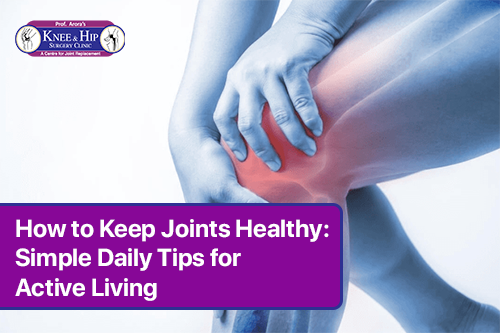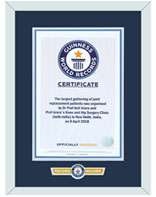
Whether you're walking, running, bending down to tie your shoes, or lifting something at home—your joints are behind every move you make. They connect your bones and help your body stay flexible and mobile. But when your joints start to feel stiff or painful, even the simplest tasks can become a struggle.
The good news? With a little care, you can keep your joints healthy and pain-free—no matter your age. In this blog, we’ll share simple tips to help you prevent joint discomfort, keep your joints working smoothly, and understand how physical therapy can support your joint health.
Preventing Joint Pain
Joint pain can show up for many reasons—it might be from an old injury, a health condition like arthritis, or just everyday wear and tear. The good news is, there are simple things you can do to help keep joint pain at bay.
Stay Active: Moving your body is one of the best ways to protect your joints. Try walking briskly, swimming, or riding a bike—these activities keep your joints flexible and strong. Plus, staying active helps manage your weight, which takes pressure off your knees, hips, and back.
Drink Plenty of Water: Staying hydrated isn’t just good for your skin—it’s great for your joints too. Water keeps the cartilage in your joints soft and cushioned, so everything moves smoothly and pain-free.
Protect Your Joints: If your job or routine includes a lot of repetitive movements or heavy lifting, make sure to take breaks and use proper techniques. And don’t underestimate a good pair of supportive shoes—they can go a long way in reducing stress on your joints.
Keeping Your Joints Moving Smoothly
If you want to stay active and move freely, keeping your joints flexible is key. Here are some easy, everyday habits that can make a big difference:
Build Muscle Strength: Strong muscles act like bodyguards for your joints—they support and protect them. Try adding strength exercises like lifting weights or using resistance bands to your routine. The stronger your muscles are, the more stable your joints will be, and the lower your risk of injury.
Make Stretching a Habit: Stretching regularly—especially before and after workouts—can work wonders. It boosts blood flow, keeps your muscles relaxed, and helps your joints stay flexible. Focus on areas that tend to get stiff, like your:
- Shoulders
- Hips
- Knees
- Ankles
These spots often tighten up from sitting too long, repeating the same motions, or intense exercise. Making stretching a daily habit can ease discomfort, improve posture, and help you move better in your day-to-day life.
Watch Your Weight: Extra weight puts extra stress on your joints—especially the ones that carry you around, like your knees, hips, and lower back. Keeping your weight in check helps lighten the load on your joints and makes movement easier and less painful.
Mind Your Posture: How you sit, stand, and walk matters more than you might think. Good posture keeps your joints aligned, which means less strain and less pain. Pay attention to how you carry yourself—it’s a small habit that can make a big difference in your joint health over time.
Best Joint Replacement Surgeon
 1.png)
Dr. (Prof) Anil Arora
Vice Chairman & Head of Department Orthopaedics & Joint Replacement Surgery, Max Super Speciality Hospital, Patparganj, Delhi
Chairman & Chief Surgeon, Prof. Arora's Knee & Hip Surgery Clinics, NCR
Education & Training:
- DNB in Orthopaedics from National Board of Examinations
- MS in Orthopaedics from Dr. SN Medical College, Jodhpur
Hospital: Max Super Specialty Hospital
Clinic: Prof. Arora’s Knee & Hip Surgery Clinics, Delhi NCR
Experience: 33+ Years
- Commonwealth Academic Staff Fellowship in Primary, Complex & Revision Joint Replacement Surgery: Royal National Orthopaedic Hospital - Stanmore, London (UK)
- Professor at University College of Medical Sciences & GTB Hospital, New Delhi
- Assistant Professor at Dr SN Medical College & Mahatma Gandhi Hospital, Jodhpur
- Senior Resident at University College of Medical Sciences & GTB Hospital, New Delhi
Specialty: Orthopaedic Joint Replacement (Robotic Knee & Hip Replacement) Max Super Specialty Hospital
About: Dr. (Prof.) Anil Arora, Guinness world record holder and Limca book of records holder, is a Senior Robotic Total Knee & Hip Replacement surgeon. He has performed over 12,000 surgeries since 1988. He is a pioneer in pinless computer navigated joint replacements and regularly performs complex revision surgeries.
How Physical Therapy Can Help Your Joints
If joint pain is making it hard for you to move freely, physical therapy can be a game-changer. Trained physical therapists can create a plan tailored to your needs to help ease pain and improve how your joints work.
Custom Exercise Plans: A physical therapist will design a personalized workout plan that focuses on improving your flexibility, strength, and balance—all of which are crucial for keeping your joints healthy. These exercises are targeted to specific problem areas to help you move more comfortably and avoid further issues.
Helpful Tips and Guidance: Therapists also teach you smart ways to protect your joints in daily life. From lifting heavy items properly to bending the right way, these small changes can help reduce strain and prevent injuries.
Pain Relief Techniques: Physical therapy isn’t just about exercise. It can also include treatments like:
- Massage therapy to boost blood flow and ease muscle tension
- Heat therapy to relax tight joints and improve movement
- Cold therapy to reduce swelling and soothe pain
- Gentle stretching to maintain flexibility and reduce stiffness
Supportive Tools: Sometimes, using tools like braces or splints can make a big difference. A physical therapist might recommend these to support a weak or painful joint, giving it extra stability and helping you move more easily. They can also prevent further damage if you're healing from an injury.
When to Seek Professional Help
If your joint pain or stiffness isn’t going away—even after rest, lifestyle changes, or home remedies—it might be time to speak with a healthcare professional. Don’t ignore persistent discomfort. Getting the right advice early on can make a big difference in protecting your joints from further damage and maintaining their strength and flexibility.
Final Thoughts
Taking care of your joints now can save you from a lot of pain later. By staying active, following simple prevention tips, using physical therapy when needed, and knowing when to seek help, you can keep your joints moving smoothly and comfortably. Healthy joints mean a healthier, more active life—so make them a priority.




